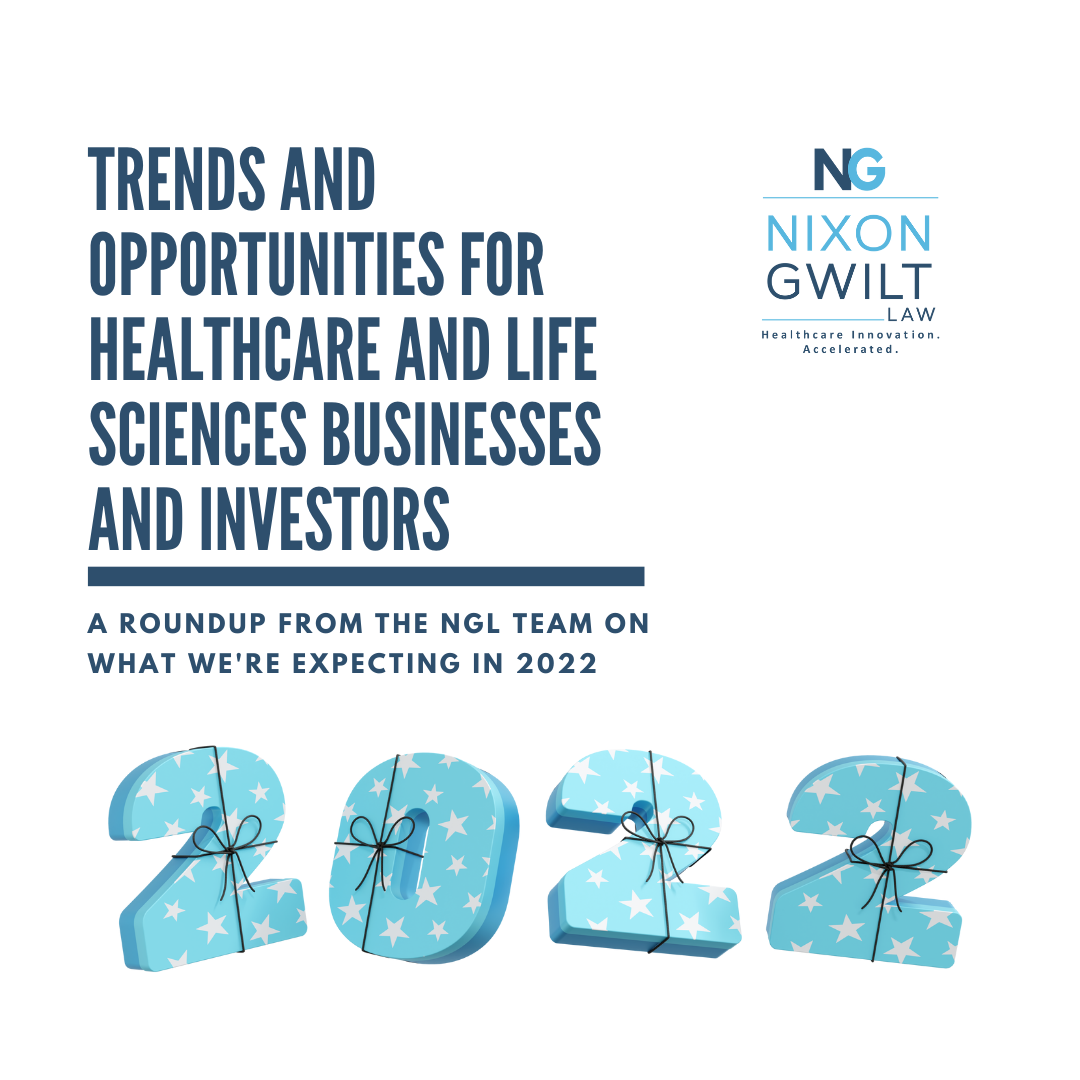No centralized framework for the regulation of artificial intelligence in the United States currently exists. That said, the flurry of regulatory policymaking and legislation, congressional hearings and inquiries, and industry stakeholder organization around the development and deployment of healthcare AI portends major developments in the coming years. Experienced entrepreneurs and executives know that the ability to peer into the future can pay dividends, and we agree.
Read MoreIf you missed our most anticipated webinar of the year, be sure to catch the replay!
Find out what Healthcare and Life Sciences businesses and investors anticipate for the healthcare industry in 2022.
Read MoreWith these new RTM codes set to go into effect January 1, 2022, RPM vendors already in the remote monitoring arena should start preparing now for how they can take advantage of this new reimbursement opportunity.
Read MoreWelcome to January 2020! I am Tommy Miller, I am Senior Counsel, and life science practice lead here at Nixon Law Group. Today I want to walk you through what I think are the highs and lows of 2019, specifically related to the legislative and regulatory actions taken in the pharmaceutical and medical device space.
Read MoreDespite division along party lines and industry pushback, the House of Representatives has passed legislation (H.R. 3), the “Lower Drug Costs Now Act”, which would require the Department of Health and Human Services (DHHS) to establish a “Fair Price Negotiation Program” responsible for negotiating Medicare payments for some of the most expensive drugs available to Medicare beneficiaries.
Read MoreWhen developing new medical device and drug products, it is important to understand how the product will be adopted and paid for in the marketplace. The development of new drugs and devices involves countless hours researching, testing, modifying, iterating, and testing some more… In larger companies, whole teams of people also dedicate the same effort into developing a market access plan—meaning careful planning for manufacturing, distribution, and insurance contracting. This strategic planning can be overlooked in start-up biotech companies operating on limited resources and which are squarely focused on innovating new technologies.
Read MoreThe FDA has just issued four final guidance documents related to the 510(k) clearance applications for medical devices. The Guidance documents can be found here, and they describe the FDA’s current thinking on special 510(k) clearance programs such as the Abbreviated application and the newly established “Special 510(k)” program.
Read MoreHospitals and medical device manufacturers will both benefit from the Centers for Medicare and Medicaid Services’ (CMS) finalization of the 2020 Inpatient Prospective Payment System (IPPS) Final Rule (“Final Rule”) scheduled to be published on August 16, 2019. In an effort to increase Medicare beneficiaries’ access to innovative medical technologies, CMS has finalized certain changes to the “new technology add-on payment” “(NTAP) application and payment processes under the Final Rule. This change is likely to encourage hospital adoption of new technologies, which is intended to spur innovation and additional investment in these technologies.
Read MoreFollowing its July 15th letter to Virginia Industrial Hemp Processors (“Processors”) notifying them of Governor Ralph Northam’s recent directive regarding the manufacture of CBD in Virginia, the VDACS Food Safety Program (the “FSP”) sent a letter to Processors on Friday, July 26th setting forth guidelines for Processors to follow when manufacturing cannabidiol (“CBD”) products intended for human consumption (the “Food Safety Letter”).
Read MoreIn Virginia’s 2019 General Assembly (GA) Session, five of six proposed cannabis-related bills passed and will soon reach the desk of the Governor, ushering in some significant changes to the Commonwealth’s medical cannabis program. Among them, allowing full therapeutic-strength medical cannabis preparations, and the addition of physician assistants and nurse practitioners to the list of providers permitted to make medical cannabis recommendations.
Read MoreOn December 12, 2018, Congress passed the 2018 Farm Bill (The “Agriculture Improvement Act of 2018” or the “Bill”), which includes provisions that exempt Cannabis plants with lower than 0.3% THC content (also called “Hemp”) from the Controlled Substances Act (CSA). Once signed into law, the Farm Bill effectively legalizes the production, commercialization, and interstate shipment and sale of hemp and hemp-derived products like cannabidiol or “CBD”. Each state (including Indian Tribes and U.S. Territories) will eventually be able to regulate hemp production like any other agricultural commodity, as long as the U.S. Department of Agriculture (USDA) approves its plan to monitor and regulate the plant’s production.
Read MoreThe Cures Act is aimed at modernizing and personalizing healthcare by encouraging innovation and streamlining the process for discovery, development, and delivery of new treatments and technologies to those suffering from illness. Importantly, the legislation provides for significant funding to advance these goals, to the tune of $4.8 billion to the National Institutes of Health ("NIH"), $500 million to the Food & Drug Administration ("FDA"), and $1 billion in grants to states for opioid abuse prevention and treatment. This article will provide an overview of key components of the Cures Act and highlight implications for the future of healthcare.
Read MoreThe U.S. Food and Drug Administration is currently accepting requests from medical software developers to participate in a precertification pilot program that is scheduled to begin September 1, 2017. The program is aimed at developing precertification criteria for software companies that would allow approved companies to engage in a streamlined premarket review process for certain digital health products. The FDA will accept up to nine participants for the pilot program, which the Agency says will include both large, established software developers and small startup companies.
Read More















